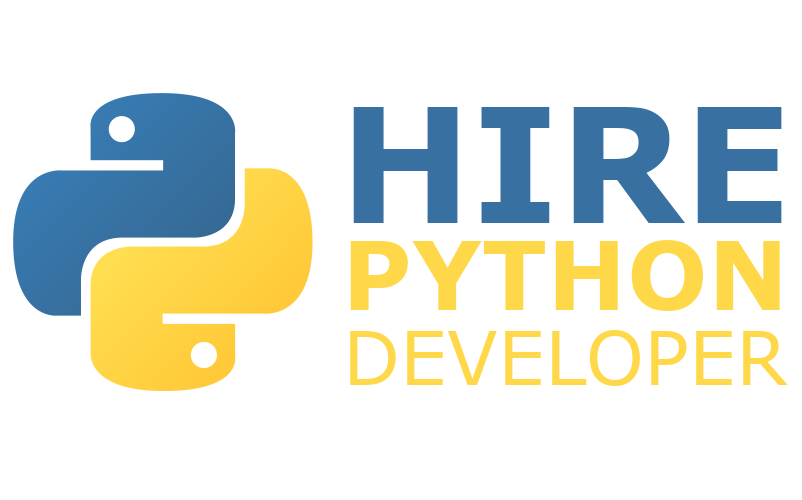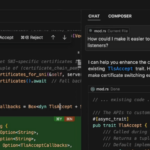Here’s a table summary of the projects, starting with the most stars:
| Rank | Project Name | Stars | Contributors | Forks | Issues | Pull Requests |
|---|---|---|---|---|---|---|
| 1 | public-apis / public-apis | 286k | 1,262 | 31.2k | 17 | 247 |
| 2 | jackfrued/Python-100-DaysPublic | 148K | 12 | 51K | 522 | 189 |
| 3 | huggingface/transformers | 122K | 2,375 | 24.2K | 778 | 245 |
| 4 | nvbn/thefuck | 82.3k | 186 | 3.4k | 243 | 83 |
| 5 | sherlock-project/sherlock | 50.3k | 201 | 6k | 72 | 140 |
| 6 | pandas-dev/pandas | 41.5k | 3,153 | 17.2k | 3.6k | 118 |
| 7 | psf/black | 37.1k | 438 | 2.4k | 350 | 30 |
| 8 | gradio-app/gradio | 27.5k | 262 | 2k | 454 | 16 |
| 9 | freqtrade/freqtrade | 24.9k | 268 | 5.4k | 36 | 8 |
| 10 | chatchat-space/Langchain-Chatchat | 24.8k | 119 | 4.3k | 137 | 5 |
| 11 | chatgpt-on-wechat | 23.1k | 50 | 6.4k | 353 | 30 |
| 12 | Hello-Python | 20.9k | 0 | 1.4k | 7 | 2 |
| 13 | RVC-Boss/GPT-SoVITS | 18.5k | 53 | 2k | – | 38 |
| 14 | reflex-dev/reflex | 15.3k | 113 | 845 | 335 | 49 |
| 15 | facefusion/facefusion | 12.7k | 7 | 1.7k | 2 | 0 |
1. public-apis / public-apis
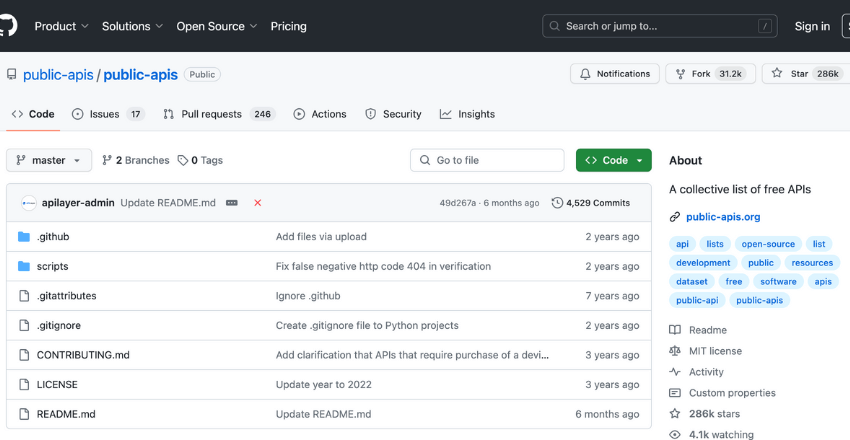
Contributors: 1262
Forks: 31.2k
Issues: 17
Pull Requests: 247
Stars: 286k
What it is: The GitHub project “public-apis” is a curated list of freely available APIs for development across various domains like animals, anime, business, finance, music, news, sports, and more.
It aims to provide developers with easy access to tools that can enhance their applications or projects without cost.
2. jackfrued/Python-100-DaysPublic
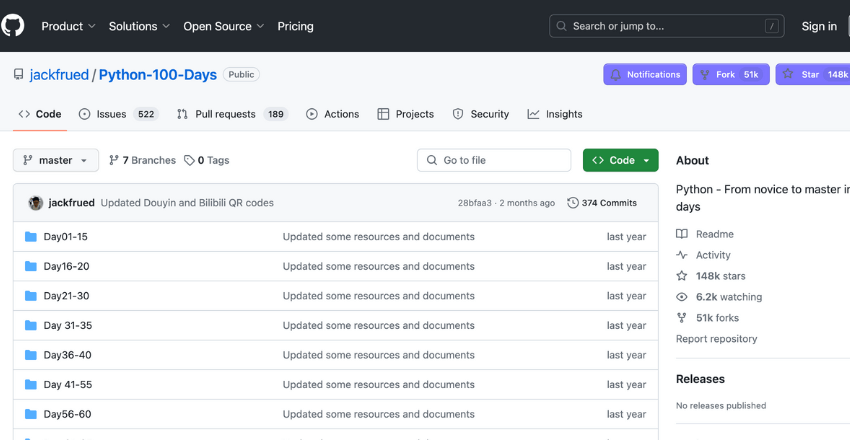
Contributors: 12
Forks: 51K
Issues: 522
Pull Requests: 189
Stars: 148K
What it is: The “Python-100-Days” GitHub project is a comprehensive guide aimed at teaching Python programming from scratch to mastery over the course of 100 days.
It is structured to cover various aspects of Python, including basics, advanced topics, web development, data analysis, and more, through detailed lessons and practical projects.
This resource is intended for both beginners and intermediate learners looking to deepen their Python skills.
3. huggingface/transformers
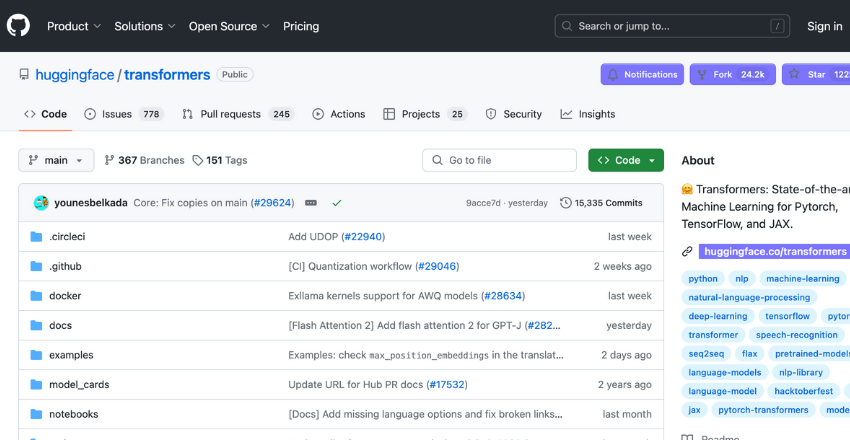
Contributors: 2375
Forks: 24.2K
Issues: 778
Pull Requests: 245
Stars: 122K
What it is:The “transformers” project by Hugging Face provides state-of-the-art machine learning models for PyTorch, TensorFlow, and JAX. It supports a wide range of tasks across different modalities such as text, images, and audio.
This library makes it easy to download, use, and share pre-trained models, facilitating tasks like text classification, question answering, and more in over 100 languages. It’s designed to be user-friendly, allowing for seamless integration across different deep learning frameworks.
4. nvbn/thefuck
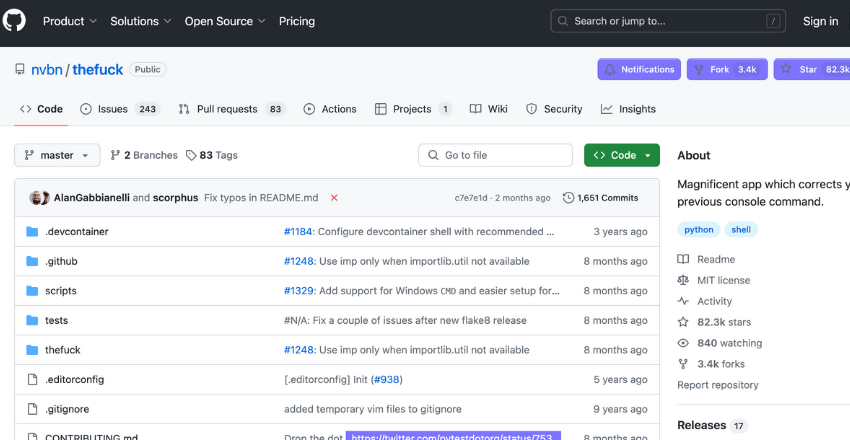
Contributors: 186
Forks: 3.4k
Issues: 243
Pull Requests: 83
Stars: 82.3k
What it is:The GitHub project “thefuck” is a clever tool that corrects mistakes in previous console commands. It’s designed to recognize and fix common errors, offering a corrected command that you can run with a simple shortcut.
This tool supports various command line mistakes, ranging from misspellings to forgotten prefixes like “sudo”. It’s like having a safety net for command line errors, making it easier and faster to correct them.
5. sherlock-project/sherlock
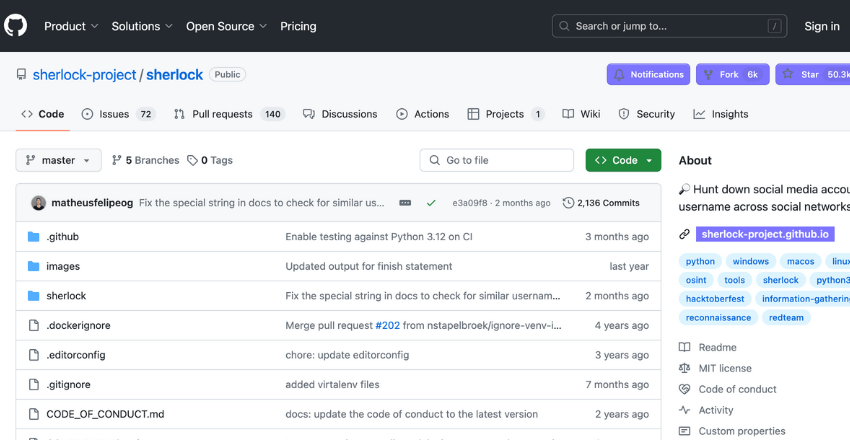
Contributors: 201
Forks: 6k
Issues: 72
Pull Requests: 140
Stars: 50.3k
What it is:The “Sherlock” project on GitHub is a tool designed to find social media accounts using a username across different social networks.
It helps users track down the online presence of a specific username on various platforms, making it useful for research or personal curiosity. The tool is open-source, meaning anyone can use or contribute to its development.
6. pandas-dev/pandas
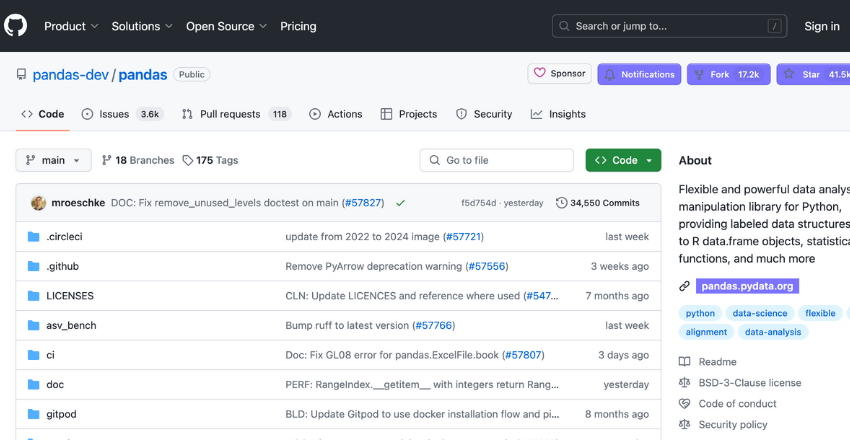
Contributors: 3,153
Forks: 17.2k
Issues: 2.6k
Pull Requests: 118
Stars: 41.5k
What it is: pandas is a Python package that provides fast, flexible, and expressive data structures designed to make working with “relational” or “labeled” data both easy and intuitive. It aims to be the fundamental high-level building block for doing practical, real world data analysis in Python.
Additionally, it has the broader goal of becoming the most powerful and flexible open source data analysis / manipulation tool available in any language.
7. psf/black
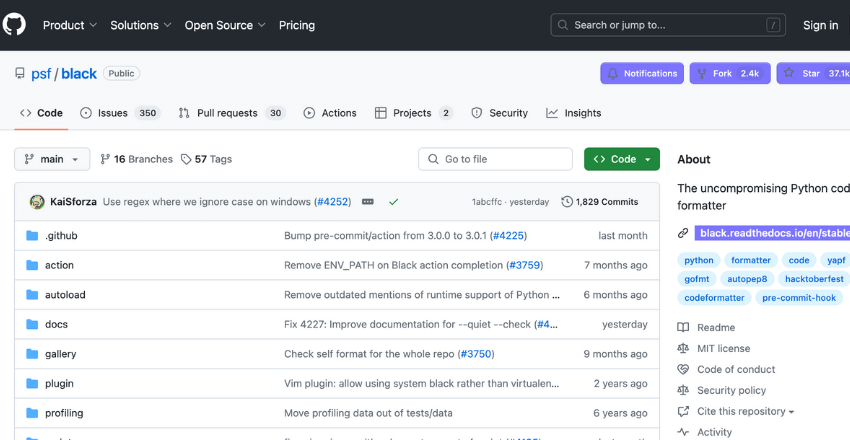
Contributors: 438
Forks: 2.4k
Issues: 350
Pull Requests: 30
Stars: 37.1k
What it is: Black is the uncompromising Python code formatter. By using it, you agree to cede control over minutiae of hand-formatting. In return, Black gives you speed, determinism, and freedom from pycodestyle nagging about formatting. You will save time and mental energy for more important matters.
Blackened code looks the same regardless of the project you’re reading. Formatting becomes transparent after a while and you can focus on the content instead.
Black makes code review faster by producing the smallest diffs possible.
8. gradio-app/gradio
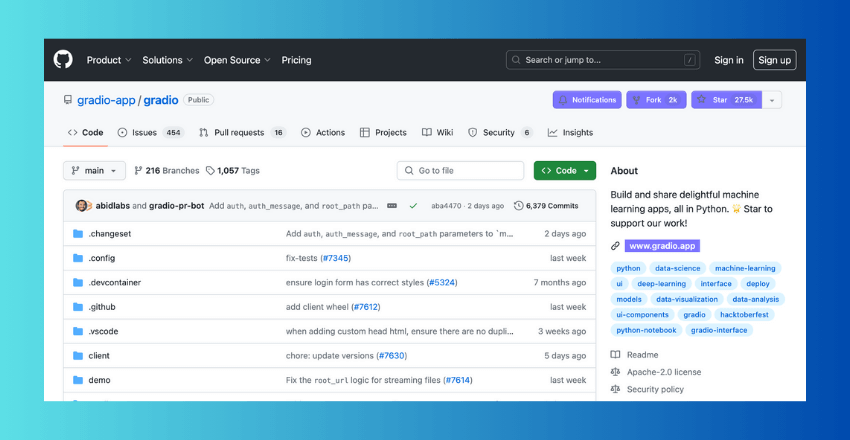
Contributors: 262
Forks: 2k
Issues: 454
Pull Requests: 16
Stars: 27.5k
What it is: Gradio is an open-source Python package that allows you to quickly build a demo or web application for your machine learning model, API, or any arbitrary Python function.
You can then share a link to your demo or web application in just a few seconds using Gradio’s built-in sharing features. No JavaScript, CSS, or web hosting experience needed.
9. freqtrade/freqtrade
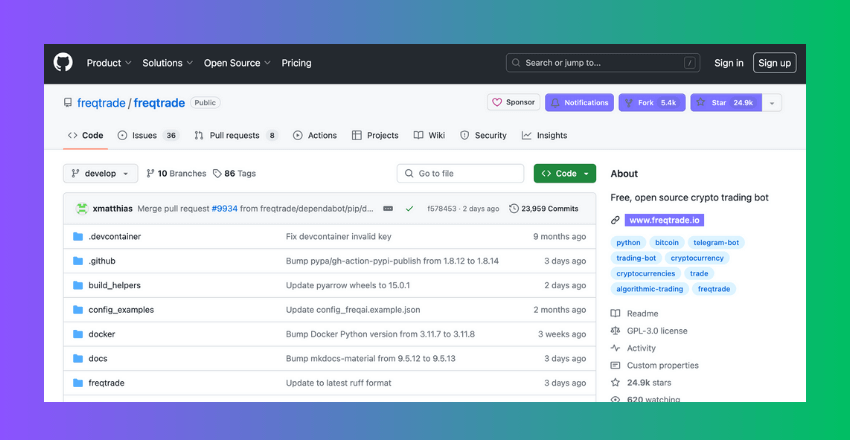
Contributors: 268
Forks: 5.4k
Issues: 36
Pull Requests: 8
Stars: 24.9k
What it is: Freqtrade is a free and open source crypto trading bot written in Python. It is designed to support all major exchanges and be controlled via Telegram or webUI. It contains backtesting, plotting and money management tools as well as strategy optimization by machine learning.
10. chatchat-space/Langchain-Chatchat
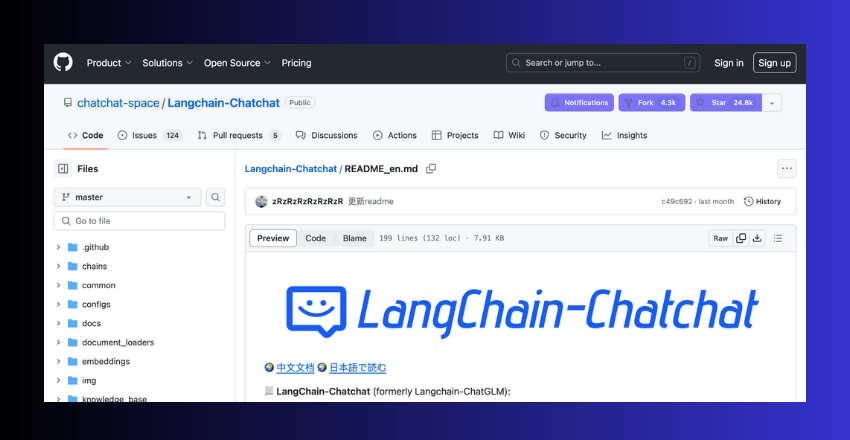
Contributors: 119
Forks: 4.3k
Issues: 137
Pull Requests: 5
Stars: 24.8k
What it is: LangChain-Chatchat (formerly Langchain-ChatGLM):
A LLM application aims to implement knowledge and search engine based QA based on Langchain and open-source or remote LLM API.
The “Langchain-Chatchat” GitHub project (formerly known as Langchain-ChatGLM) offers a solution for local knowledge-based question answering, leveraging large language models like ChatGLM. It’s designed for Chinese language scenarios and supports offline operation.
The project is inspired by other works and utilizes models such as Vicuna, Alpaca, LLaMA, Koala, and RWKV within the Langchain framework. It features API services through FastAPI and a web interface with Streamlit, emphasizing the use of open-source models for private, offline deployment.
11.chatgpt-on-wechat
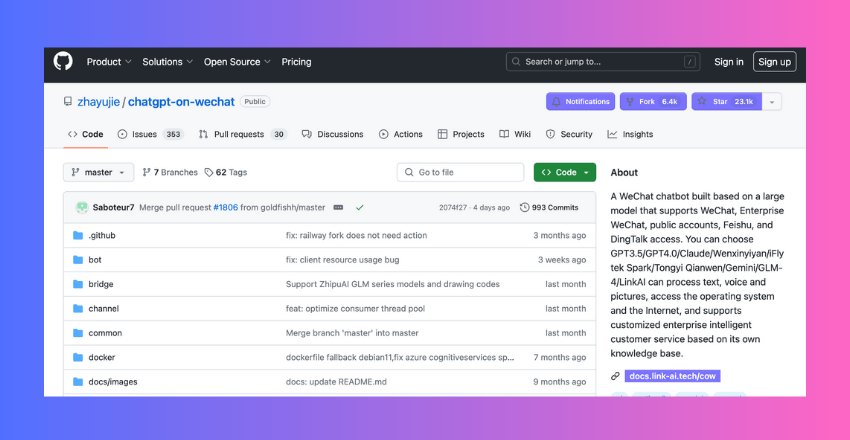
Contributors: 50
Forks: 6.4k
Issues: 353
Pull Requests: 30
Stars: 23.1k
What it is: This project is an intelligent conversational robot based on a large model.
The GitHub project “chatgpt-on-wechat” is designed to integrate AI-based chat models like GPT-3.5, GPT-4, and others into various platforms including WeChat, Enterprise WeChat, DingTalk, and others.
It supports text, voice, and image processing, allowing for diverse interactions such as conversation, image recognition, and generation.
Additionally, it can access the internet and operating systems via plugins, and it supports customization for intelligent customer service through a proprietary knowledge base.
12. Hello-Python
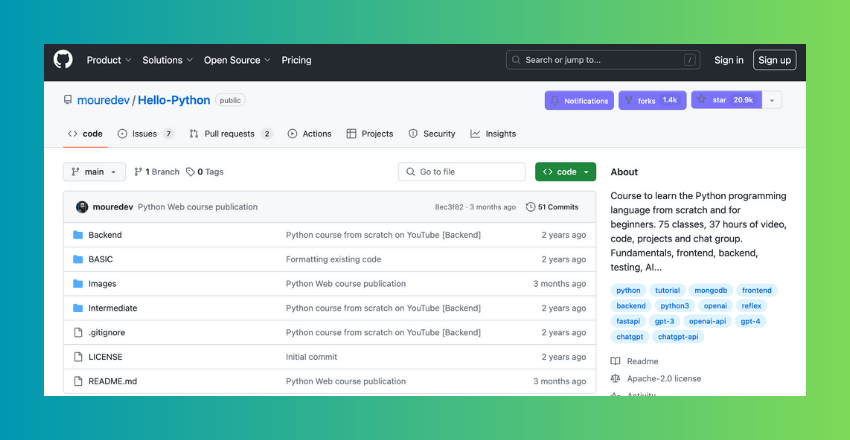
Contributors: 0
Forks: 1.4k
Issues: 7
Pull Requests: 2
Stars: 20.9k
What it is: Course to learn the Python programming language from scratch and for beginners.
The “Hello-Python” GitHub project is a comprehensive course designed to teach beginners how to program in Python from scratch. It includes 75 classes totaling 37 hours of video content, code examples, projects, and a chat group for discussion.
The course covers fundamental programming concepts, frontend and backend development, testing, and artificial intelligence. It’s structured to provide a thorough introduction to Python, making it accessible for those new to programming.
13. RVC-Boss/GPT-SoVITS
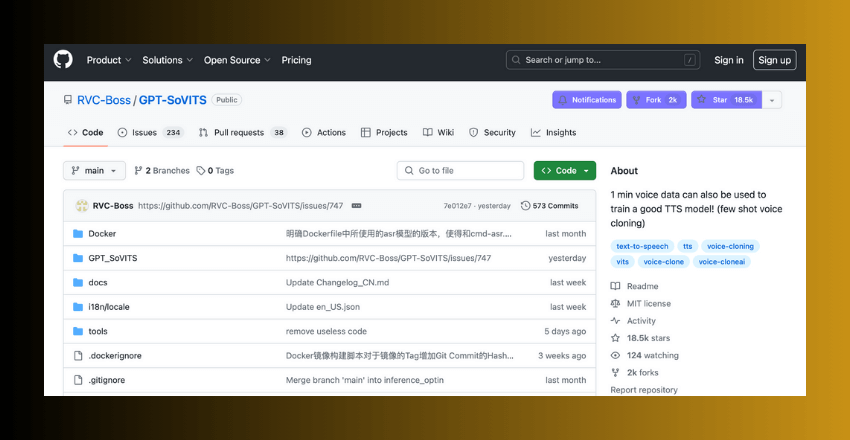
Contributors: 53
Forks: 2k
Issues: 234
Pull Requests: 38
Stars: 18.5k
What it is: A Powerful Few-shot Voice Conversion and Text-to-Speech WebUI.
The GitHub project “GPT-SoVITS” enables the creation of text-to-speech (TTS) models with minimal voice data from a person. It supports instant TTS conversion with just a 5-second voice sample and offers improved voice similarity and realism with just 1 minute of training data.
The project features support for multiple languages, integrated tools for creating training datasets, and a WebUI for easy use. It’s particularly useful for few-shot voice cloning.
14. reflex-dev/reflex
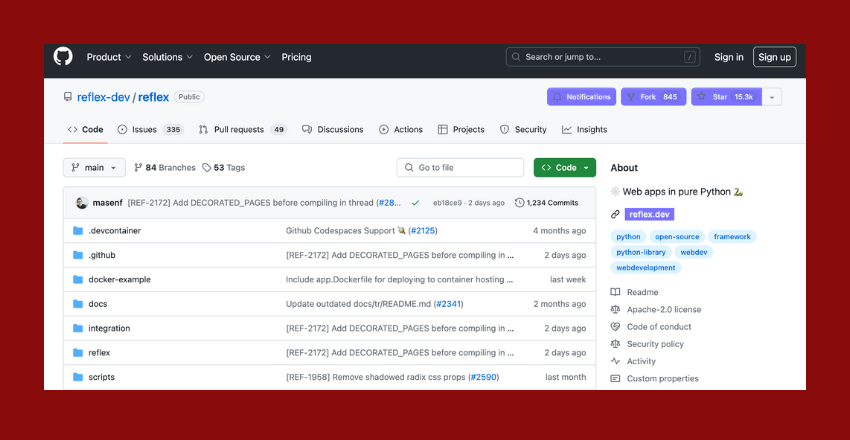
Contributors: 113
Forks: 845
Issues: 335
Pull Requests: 49
Stars: 15.3k
What it is: Performant, customizable web apps in pure Python. Deploy in seconds.
The GitHub project “reflex” allows users to create web applications using only Python. It simplifies web app development to a point where deploying a project takes just seconds.
Reflex supports Python 3.8 and above, and it includes a command-line tool that helps set up and run projects easily. An example given on the project page shows how to create a user interface for generating images with DALL-E, demonstrating Reflex’s capability for integrating with APIs and managing state within web application.
15. facefusion/facefusion
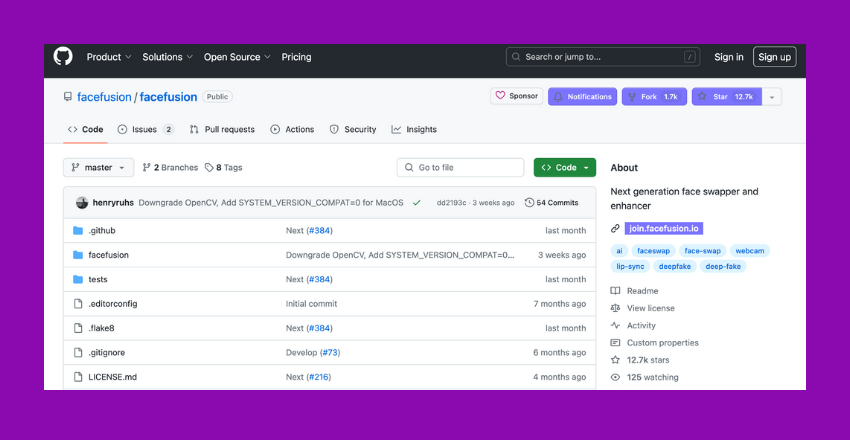
Contributors: 7
Forks: 1.7k
Issues: 2
Pull Requests: 0
Stars: 12.7k
What it is: Next generation face swapper and enhancer. The GitHub project “facefusion” is a next-generation tool designed for swapping and enhancing faces in images and videos.
It requires technical skills for installation and offers a variety of options for customization, such as selecting source and target images, defining output paths, and adjusting memory and processing settings. The project emphasizes the need for technical proficiency and advises users to seek help from their Discord community for installation issues.
Github Python Stats Methodology
To identify the most starred Python projects on GitHub, we employed a methodical approach focused on capturing and analyzing projects with significant community engagement and recognition.
Here’s a breakdown of the methodology used:
- Data Collection: The process began by aggregating data on Python repositories from GitHub, with a particular emphasis on projects known for their high levels of activity and community contribution. This included metrics such as stars, contributors, forks, issues, and pull requests.
- Metric Prioritization: Among the various metrics, the number of stars a project received was prioritized as the primary indicator of its popularity and community endorsement. Stars on GitHub serve as a bookmark for users but also signal appreciation and recognition of a project’s value, making it a crucial metric for identifying standout projects.
- Sorting and Ranking: The collected projects were then sorted based on their star count, from highest to lowest. This ranking provided a clear picture of which Python projects are currently the most celebrated and followed by the GitHub community.
- Project Analysis: For each top-ranked project, we delved into its specific features, purposes, and contributions to the Python ecosystem. This included a brief description of the project, highlighting its unique offerings, applications, and why it has garnered such a significant following.
- Continuous Monitoring: Recognizing the dynamic nature of GitHub and the constant evolution of projects, our methodology includes regular updates to reflect the latest trends, contributions, and shifts in the popularity of Python projects. This ensures the list remains relevant and accurate over time.
- Community Engagement: Beyond just analyzing the raw data, the methodology considers the broader impact of these projects on the Python community, including how they foster learning, collaboration, and development within the ecosystem.
By following this approach, we’ve curated a list of the most starred Python projects on GitHub, showcasing a diverse range of applications from APIs, machine learning, web development, data analysis, and beyond.
This not only highlights the vibrancy and innovation within the Python community but also serves as a resource for developers looking for reputable, impactful projects to learn from, contribute to, or utilize in their own work.
Conclusion
With more people contributing, forking, adding issues, pulling requests and adding stars each day, there is always new data added.
You can find the most Python Repositories contributed to, forked, issues added and stars from this list to stay updated.
Source
Matthew is a technical author with a passion for software development and a deep expertise in Python. With over 20 years of experience in the field, he has honed his skills as a software development manager at prominent companies such as eBay, Zappier, and GE Capital, where he led complex software projects to successful completion.
Matthew’s deep fascination with Python began two decades ago, and he has been at the forefront of its development ever since. His experience with the language has allowed him to develop a keen understanding of its inner workings, and he has become an expert at leveraging its unique features to build elegant and efficient software solutions.
Matthew’s academic background is rooted in the esteemed halls of Columbia University, where he pursued a Master’s degree in Computer Science.
As a technical author, Matthew is committed to sharing his knowledge with others and helping to advance the field of computer science. His contributions to the scientific computer science community are invaluable, and his expertise in Python development has made him a sought-after speaker and thought leader in the field.
